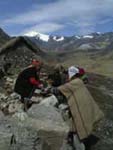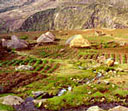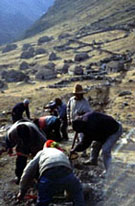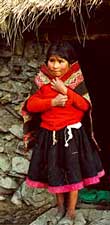U.S.A.
Ecuador
Peru

| Project:: Q'eros Community, Peru |
The Q'eros Community projects include the Children's Health Project, the Munay T'ika School and a Sustainable Living Project The Children's Health ProjectIn July, 2004, Donna Runnalls accompanied by a small group of Living Bridges supporters and friends including Larry K. Heath, MD., of Marshfield, Wi. and Deborah Malka, MD. of Aptos, Ca. traveled to Cuzco Peru to conduct an informal medical evaluation of the health of the Children of Q’eros Community. Areas of general evaluation included general nutrition, height and weight evaluations (utilizing Peruvian National standards) and lung and dental health. The project was organized for Living Bridges with the help of Richard Aguayo of Seeds for the Andes Foundation, Director of Munay Tika School. Children are especially needed by their families to help in the high mountains with animal tending and crops, and as the children had to walk for most of two days and by trucks for one day to reach Cuzco, the number of children in the project was small. Fourteen girls and boys from the Munay Tika school in the village of Charcapata, ranging from age 8-14 arrived in Cuzco accompanied by eight male elders. The seniors, who reputedly had no exact knowledge of their birthdates believed themselves to be age 70-85 years. During a one day evaluation of all children, whose diet consists mostly of potatoes were found to be in remarkably good and normal health by all standards utilized. A unique finding was the high temperature of the hands and feet of the children. The children had walked through snow to complete this journey in only sandals though reported and demonstrated no signs of frostbite or windburn. (Donna Runnalls who accompanied the children in their return trip to Charcapata, was amazed to see this fact first hand!) Dr Heath speculated that a special genetic adaptation might have endowed these children, whose ancestors have lived in the same condition for 500 years with extra capillaries to providing constant warmth to the extremities.
The project, whose costs included meals and travel costs for the children and elders was funded by a donation from Dr. Larry K. Heath. The Munay T'ika (Beautiful Flower) School + Greenhouse ProjectIn June of 2002 the construction of New Munay T'ika School Building The project was fully funded by the Wiracocha Foundation, a group which has worked extensively with sharing the traditions and knowledge offered by the Q'eros people. The new school will serve up to seventy children per day and will allow for the children to tend the greenhouse. Ongoing support from Living Bridges Foundation continues to fund the teacher's salary, supplies, books, and maintenance of the school. Parent involvement has increased and many parents are now attending the new Adult Literacy School as well. The children chose to name the school Munay T'ika Project (The Beautiful Flower Project).
Another special project of the school has been the tending and operating of the new greenhouse. The children harvested their first crops of lettuce and radishes in September, another "first" for the village. Living Bridges is providing ongoing funds for the school with donations from individuals and groups who wish to see the Charcapata school continue and the literacy program and greenhouse projects develop in other villages. Sustainable Living Project with the Q’eros Community
|
The Living Bridges Foundation • P.O.Box 667 • Aptos CA 95001 USA • Contact us
©1999-2009 Living Bridges Foundation

Dr. Heath & patient

Students in the Greenhouse

Medical Project Team & Elders

Building the Aqueduct

Hatun Q'eros

Building Pipeline

Blessing the Water

A Young Q'eros
 Dr. Health, who specializes in Internal Medicine
and Geriatrics also evaluated the elders and found their blood
pressure to be the lowest he had encountered for the age range.
The only predictable finding was the incidence of dental caries.
There is no access or availability to dental care in the communities.
Traditionally the coca leaf was more readily available and when
chewed only as a stable provided fibrous material for dental cleaning.
The children treated the group to a mock performance of a ceremony
for the Earth which they wee learning, done at this time of the
year by their parents, to thank Pachamama and to predict the outcome
of the next year’s crops.
Dr. Health, who specializes in Internal Medicine
and Geriatrics also evaluated the elders and found their blood
pressure to be the lowest he had encountered for the age range.
The only predictable finding was the incidence of dental caries.
There is no access or availability to dental care in the communities.
Traditionally the coca leaf was more readily available and when
chewed only as a stable provided fibrous material for dental cleaning.
The children treated the group to a mock performance of a ceremony
for the Earth which they wee learning, done at this time of the
year by their parents, to thank Pachamama and to predict the outcome
of the next year’s crops.  and Second Greenhouse in the Q'eros village of Charcapata was officially
completed!
and Second Greenhouse in the Q'eros village of Charcapata was officially
completed!